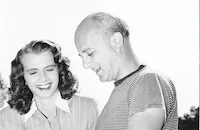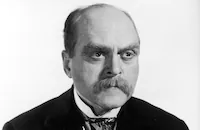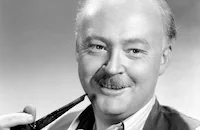Crime, Inc.
Cast & Crew
Lew Landers
Leo Carrillo
Tom Neal
Martha Tilton
Lionel Atwill
Grant Mitchell
Film Details
Technical Specs

Synopsis
In the mid-1930s, after two of his henchmen are shot down in a café, New York racketeer Bugs Kelly confides to reporter Jim Riley that a newly formed crime syndicate committed the murders after he refused to join. Unknown to Bugs, the syndicate's boss, who hides his illegal activities by posing as the president of National Brokers, Inc., a phony company, has also ordered Bugs's execution. When the order to kill Bugs is issued, however, one of Bugs's men overhears "finger man" Tony Marlow passing the word to Barry North, a racketeer posing as an exporter, and alerts Bugs. Bugs kidnaps Tony, a nightclub owner, and forces him to arrange a rendezvous with the hoodlum who was hired to kill him. After the unsuspecting thug is shot down by Bugs's men, Bugs telephones Jim and persuades him to accompany him to Atlantic City in exchange for information about the murder. To Jim's surprise, Bugs, whose real name is Mike Egan, takes him to see his sister, nightclub singer Betty Van Cleve. Jim is attracted to Betty, who knows nothing about Bugs's racketeering, and happily agrees to look after her during Bugs's upcoming "business trip." On the way back to New York, Bugs tells Jim that he is holding Tony prisoner and has demanded $100,000 for his return. Soon after, a grand jury investigating the recent wave of crime subpoenas Bugs to testify, but Bugs reveals nothing. Bugs then calls North and his superior at the syndicate, defense attorney Pat Coyle, and, while Jim listens in, arranges to pick up the ransom money. Although North and Coyle pay up, North cautions Bugs that he is "in over his head" and once again offers him a place in the syndicate. Bugs refuses, and after he releases Tony, he and his right-hand man disappear to a Coney Island hideout. Sure that their whereabouts are unknown, Bugs and his cohort visit the carnival one night and while in the wax museum, are shot by two syndicate thugs, Jud Stecker and Eddie Garr. After witnesses identify them, Stecker and Garr are convicted for the murders. Jim, meanwhile, goes to see Betty, but learns that she moved the day after Bugs's death without leaving a forwarding address. Later, Jim hears from paid informant Val Lucas, secretary to Deputy District Attorney Dixon, that Dixon has gone to see Garr in prison. There, as Lucas takes notes, Garr names Tony as the man who hired him, and Dixon notifies police commissioner Collins to arrest Tony. The greedy Lucas then telephones Tony and, for a promised $5,000, tells him about Garr's confession and which route he and Dixon will be taking from the prison. As arranged, Tony's men ambush Dixon's car, but kill Lucas as well as Dixon, then steal Lucas' notes. With no evidence, Collins is forced to release Tony and, completely frustrated, turns to Jim for help. Jim advises Collins to protect Garr, but before Collins can act on the suggestion, the convict is murdered. Jim then reunites with Betty, who now sings at Tony's club, and she confesses that she knows how Bugs died. Betty explains that she moved without telling Jim because she was afraid that he was pursuing her out of obligation to her brother, but Jim assures her of his genuine love. Later, after his novel Crime, Incorporated is published, Jim is subpoenaed by the grand jury, but refuses to name his sources. Aware that police officials have been leaking information to the syndicate, Collins then invites Jim to join his secret grand jury, whose members include the most trusted members of the public grand jury. After Jim tells Collins about National Brokers and North's phony export company, Collins takes the reporter's advice and arranges for surveillance devices, including hidden cameras, to planted there, and also orders protection for Betty. Later, at a meeting of the syndicate, the boss is revealed to be Wayne Clark, the most vocal member of both grand juries. Clark orders Jim and Betty's execution, but at Betty's apartment, the would-be killers are surprised by Collins' men. Clark, Coyle, Tony and the other syndicate members are then arrested on murder charges and are shown the evidence that Collins is sure will convict them--motion pictures of Clark and North discussing Jim and Betty's execution. Later, after Jim is called to the grand jury and thanked, he and Betty are married by a judge on the panel.

Director

Lew Landers
Cast

Leo Carrillo

Tom Neal
Martha Tilton

Lionel Atwill

Grant Mitchell

Sheldon Leonard
Harry Shannon
Danny Morton

Virginia Vale

Don Beddoe

George Meeker
Rod Rogers
Ed Cronley
Jack Gordon
Monk Friedman
Harry Hayden

Emmett Vogan
Gene Stutenroth
Earle Hodgins
Crahan Denten
Crew
Ralph Ash
James Brown
Nacio Porter Brown Jr.
Elsie Eppich
Ray Evans
Morris Friedman
Leon Fromkess
Walter Greene
Max Hutchinson
Jay Livingston
Roy Livingston
Martin Mooney
Paul Palmentola
Lou Perlof
Harry Reif
Herman Rotstein
Ray Schrock
Marla Shelton
Gene Stone

Film Details
Technical Specs

Quotes
Trivia
Notes
The film's opening credits are preceded by a shot of the following letter from FBI director J. Edgar Hoover, dated August 27, 1935 and addressed to writer/producer Martin Mooney, who was then a New York crime reporter: "Dear Mr. Mooney: I am pleased to learn of the progress you have made on your book 'Crime, Incorporated.' I feel that books of its type, written by experts in their respective fields, such as yourself, possess a vital influence in arousing the American public to the continuing, widespread menace of crime throughout our country today, particularly in our urban centers." According to an April 1944 news item, Mooney's book Crime, Incorporated exposed Louis Lepke Buchalter, James J. Hines, federal judge Martin T. Manton and Willie Bioff as criminals, and caused then New York governor Herbert H. Lehman to appoint Thomas E. Dewey as a special prosecutor. According to the same item, Harry Wurtzel was first assigned to produce the picture, James Tinling was to direct, and J. Carrol Naish was to star. Mooney was announced first as the film's technical advisor, but in early September 1944, he replaced Wurtzel as producer.
War Dept. records contained at NARS indicate that Crime, Inc. was "disapproved" for export by the Office of Censorship, Los Angeles Board of Review on January 16, 1945, because of its depiction of "organized criminal activities, murders and general lawlessness." According to a November 1, 1944 Hollywood Reporter news item, Producers Releasing Corp. anticipated the Board's reaction but went ahead with production because it felt that by the time the film was ready for export, the war would be over and the Board, disbanded. Crime, Inc. marked singer Martha Tilton's first dramatic role. Hollywood Reporter news items and production charts add Carl O'Bryan but his appearance in the final film has not been confirmed.












